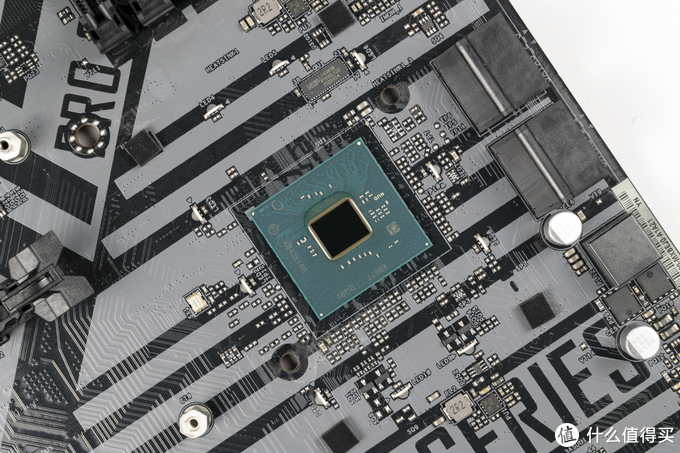It’s well documented that Intel’s 11th Generation Rocket Lake processors are not compatible with H410 and B460 motherboards. A new report from a Chinese forum (via momomo_us) claims that the upcoming 14nm chips might not even work on all Z490 motherboards.
The author has shared some compelling evidence why this is the case. In summary, the reasons boil down to the lack of support on a chipset and BIOS level, but more importantly, the design of the motherboard’s power delivery subsystem.
Chipset Segmentation
The first reason for the incompatibility resides in the chipset. Intel’s desktop 400-series family consists of six chipsets: Z490, W480, Q470, H470, B460 and H410. In a pre-Comet Lake leak, we learned that Intel had segmented the 400-series chipsets into two classifications. The Z490, W480, Q470 and H470 formed the Comet Lake PCH-H group, while the B460 and H410 chipsets belonged to the Comet Lake PCH-V group. While we never really found out the meaning for the suffix, we had presumed that the “H” represented High-Performance and the “V” meant Value. Now that we look back at the categories, it starts to make sense why the B460 and H410 chipsets don’t support Rocket Lake.
As the author explained, each processor possesses a CPU_ID that the chipset utilizes to identify the chip. Logically, the processor will not work if the chipset doesn’t recognize the CPU_ID. Apparently, the workaround is simple and consists of disabling the CPU_ID in the Intel Management Engine (ME) section of the BIOS. Motherboard vendors, such as Gigabyte, found a more elegant solution that consists of silently slipping a different chipset into its H410 motherboards.
Zero BIOS Support
The BIOS also plays an important role in processor support. If the processor’s microcode isn’t in the database, the chip will obviously not work on the motherboard. Here’s where a bit of speculation comes in.
It’s possible that Intel had already decided that Comet Lake PCH-V chipsets will not support Rocket Lake so the processors weren’t taken into consideration during the development of the BIOS. Again, the answer is as easy as extracting the microcode from the Z590 BIOS and implanting it into the target motherboard. This isn’t a new practice either as motherboard vendors have been doing it for ages. For example, Soyo created an H310 motherboard that supported the previous generation of Intel processors behind the chipmaker’s back.
Inadequate Power Supply
Image 1 of 3
Image 2 of 3
Image 3 of 3
The last and probably the most important reason why Rocket Lake processors are locked out from 400-series motherboards has to do with the power delivery subsystem. The power delivery subsystem’s job is to convert the 12V and 5V voltages down to lower voltages that the processor can use. In this case, we have voltages, such as the Vcore (core), Vgt (core display), VCCSA (system agent), VCCIO (input and output), VCCM (memory), VCCST (maintenance voltage), VCCST_PLL (clock maintenance voltage), just to mention a few.
According to the author’s investigation, Comet Lake-S and Rocket Lake-S processors didn’t experience any changes in the Vcore and Vgt. The VCCSA and VCCIO voltages, however, has reportedly undergone a shift.
In an example, the forum user dissected the ASRock Z590 Pro4 motherboard to find a Reneas RAA229001 controller that controls the VCCSA voltage. The previous VCCSA controller, which operated in fixed mode, featured a single-phase PWM with a single-phase MOS and sometimes shared with the VCCIO.
With Rocket Lake-S, Intel seemingly changed the power delivery mode of the VCCSA to SVID. The author explained that the power supply voltage is the same as Vcore, therefore, the processor directly controls it. As a result, it’s not possible to share the power delivery or use another PWM. By force, you need a PWM IC that complies with Intel’s IMVP8 specifications. Motherboards the lack a SVID PWM controller cannot accommodate Rocket Lake-S chips.
On the topic of VCCIO, the review provided two circuit diagrams that contrast the B460 and Z590 motherboards. Based on his observations, the VCCIO for Rocket Lake-S is split into three parts: VCCIO_0, VCCIO_1_2. As you can see from the B460 motherboard, there is no connection lines to the VCCIO_1_2. It seems that Intel sets aside the RSVD pins in the LGA1200 socket to connect to the VCCIO_1_2. For reasons, which probably have to do with cost reduction, the RSVD pins for B460 and H410 motherboards are epty so there’s no power going to VCCIO_1_2, which feeds the PCIe and other interfaces.
The reviewer provided a list of Z490 motherboard that he thinks won’t support Rocket Lake chips. MSI’s Z490 S01 and Z490M S01 motherboards as well as ASRock’s Z490 Phantom Gaming 4, Z490 Pro4, Z490M Pro4, Z490M-ITX/ac and B460M Steel Legend are part of his list.
